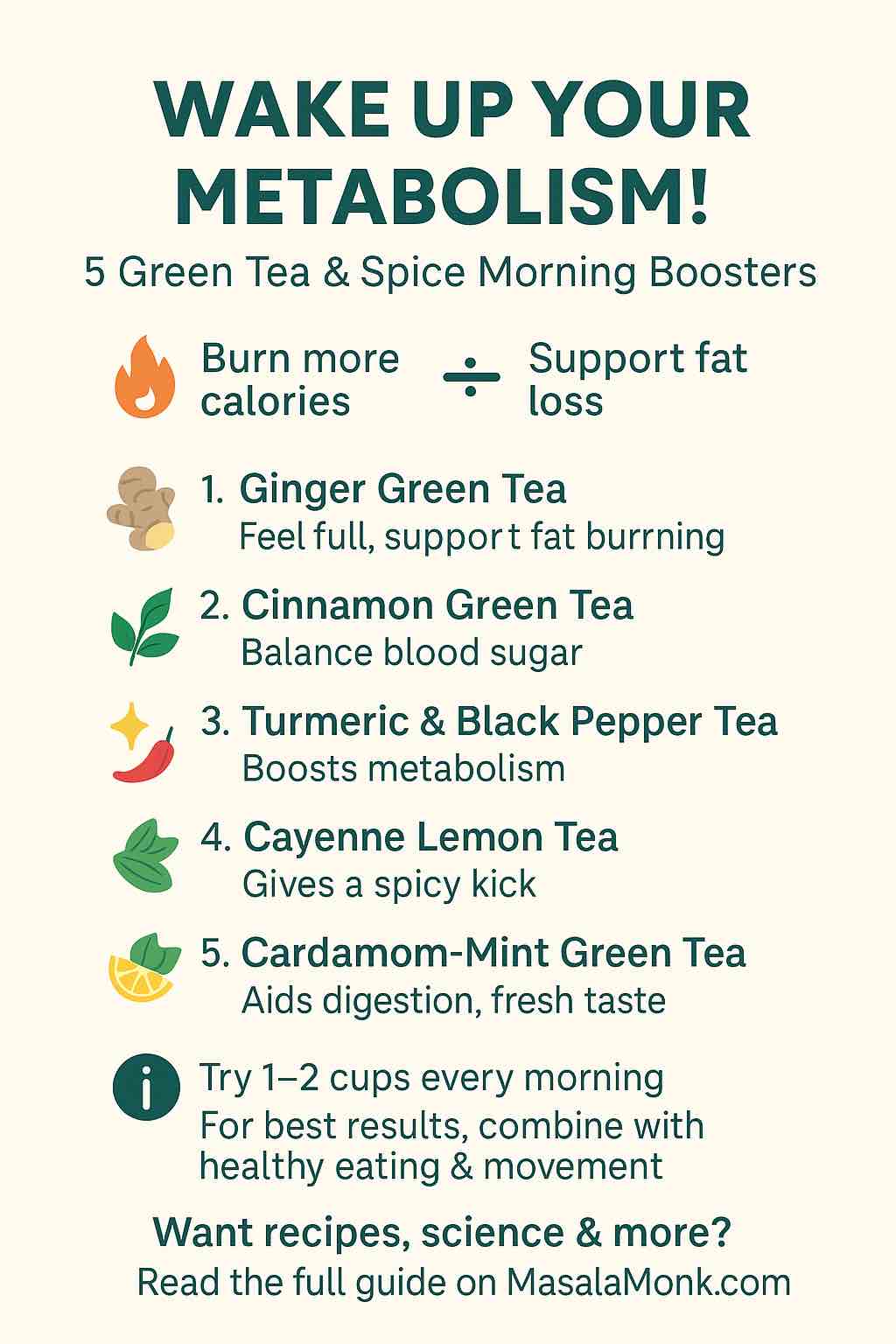
Wake Up, Fire Up: Start Your Day with a Natural Metabolic Kick
Ever wished you could start your day with something that actually helps your metabolism wake up, not just your brain? You’re in good company. Science shows certain herbs, teas, and spices can give your morning routine the edge you need—supporting weight loss, boosting energy, and making those early hours a little more exciting.
If you’re looking for real results (not fad-diet hype), let’s explore 5 green tea and spice infusions that have stood up to recent scientific scrutiny and offer practical, tasty ways to jumpstart your day.
Why Green Tea & Spices?
Green tea isn’t just your grandmother’s beauty secret. Loaded with antioxidants called catechins (especially EGCG) and a gentle dose of caffeine, green tea supports thermogenesis (your body’s calorie-burning engine) and fat oxidation. But add a few choice spices—like ginger, cinnamon, turmeric, black pepper, and cayenne—and you unlock a blend of natural chemicals that work together for even better effects.
Here’s the Science in Simple Terms:
- Thermogenesis: These teas & spices raise your internal body temperature, making your body burn more calories to maintain balance.
- Fat Oxidation: Green tea catechins and capsaicin from cayenne help your body use fat as energy.
- Appetite Regulation: Ginger, cinnamon, and mint can help curb those morning cravings, making it easier to stick to your goals.
- Blood Sugar Balance: Cinnamon and turmeric stabilize glucose swings that can drive overeating.
Bottom Line: These ingredients don’t melt fat magically, but they nudge your metabolism in the right direction—especially when paired with good habits.
The Five Powerhouse Morning Infusions
Let’s get practical. Here are five easy, delicious, research-backed recipes for your morning mug. Each comes with its own science-backed edge, so you can rotate them or pick your favorite.
1. Ginger Green Tea
Why it works: Ginger boosts thermogenesis, tames inflammation, and helps you feel full.
Recipe:
- 1 green tea bag or 1 tsp loose green tea
- 1 tsp freshly grated ginger (or ½ tsp dried ginger)
- 1 cup freshly boiled water
How-to:
Steep green tea and ginger together for 5 minutes. Add a squeeze of lemon for extra vitamin C.
Science Snap:
A 2024 meta-analysis (27 human trials!) showed ginger (2g/day) reduces body weight, waist size, and appetite when used consistently.
2. Cinnamon Green Tea
Why it works: Cinnamon helps control blood sugar and may curb fat storage.
Recipe:
- 1 green tea bag
- ½ to 1 tsp ground Ceylon cinnamon or 1 stick cinnamon
- 1 cup hot water
How-to:
Steep the tea and cinnamon together for 5 minutes. Remove the stick if using. Sweeten with a little stevia or honey if desired.
Science Snap:
Meta-analyses confirm regular cinnamon intake reduces BMI and waist circumference, with effects visible in just a few weeks.
3. Turmeric & Black Pepper Green Tea
Why it works: Turmeric is anti-inflammatory; black pepper’s piperine increases the bioavailability of curcumin, turmeric’s active ingredient.
Recipe:
- 1 green tea bag
- ¼ tsp ground turmeric
- Pinch of black pepper
- 1 cup hot water
How-to:
Steep all together for 4–5 minutes. Add a dash of honey or a slice of orange for flavor.
Science Snap:
Clinical reviews up to 2025 show this combo improves metabolic health, aids fat loss, and even boosts mood in some participants.
4. Cayenne Lemon Green Tea
Why it works: Capsaicin from cayenne ramps up calorie burn and may reduce hunger.
Recipe:
- 1 green tea bag
- Pinch of cayenne pepper (start small!)
- Juice of ½ fresh lemon
- 1 cup hot water
How-to:
Steep tea and cayenne together for 3–5 minutes. Add lemon juice last. Sip slowly.
Science Snap:
RCTs suggest 2–4mg of capsaicin daily can decrease body fat over 8–12 weeks—but go easy to avoid stomach upset.
5. Cardamom-Mint Green Tea
Why it works: Cardamom supports digestion and metabolism; mint refreshes and may help curb appetite.
Recipe:
- 1 green tea bag
- 2 lightly crushed cardamom pods or ¼ tsp ground cardamom
- Handful of fresh mint leaves
- 1 cup hot water
How-to:
Steep tea, cardamom, and mint together for 5 minutes. Enjoy warm or as an iced tea.
Science Snap:
While not as heavily studied as the other spices, both cardamom and mint have shown benefits in digestion and appetite suppression.
How to Use These Infusions for Best Results
Consistency matters:
Drink one of these infusions every morning, ideally before breakfast or mid-morning. You can rotate recipes to keep things interesting and maximize benefits.
Keep it safe:
- 2–3 cups per day is a reasonable upper limit for most people.
- If you’re sensitive to caffeine, try decaf green tea—some benefits remain.
- Pregnant/nursing, on blood thinners, or with gallstones? Check with your doctor before adding a lot of green tea, turmeric, or ginger.
Pair with:
- A high-protein breakfast or balanced meal for lasting satiety and energy.
- A few minutes of gentle movement (walk, stretches, yoga) to synergize metabolic effects.
What NOT to do:
- Don’t over-sweeten. Try stevia, monk fruit, or a tiny drizzle of honey if needed.
- Don’t expect miracles without healthy eating and movement.
- Don’t use green tea extract supplements unless guided by a healthcare pro—stick with brewed tea.
Frequently Asked Questions
1. Can I use any type of green tea for these infusions?
Answer:
Yes, you can use any unsweetened green tea—loose leaf, bagged, or matcha. Just avoid flavored or pre-sweetened teas, which may have additives or sugar that reduce the health benefits.
2. Is it okay to add sweetener to these infusions?
Answer:
You can add a small amount of natural sweetener like honey, stevia, or monk fruit if needed. Try to limit added sugars, as they can counteract some weight loss benefits. Taste first; many find the spices provide enough flavor!
3. How long should I steep the spices with the tea?
Answer:
Most spices and green tea steep best together for 4–5 minutes. For a stronger flavor, let spices steep longer and add the tea bag in the last 2–3 minutes to avoid bitterness.
4. Can I drink these teas if I’m sensitive to caffeine?
Answer:
Absolutely! Use decaf green tea or even a mild white tea as a substitute. While some metabolic benefits come from caffeine, the spices themselves offer plenty of support.
5. How soon will I see results from drinking these infusions?
Answer:
Visible results typically occur after 8–12 weeks of consistent daily use, combined with a balanced diet and regular exercise. These infusions support healthy habits but aren’t quick fixes.
6. Are there any side effects I should be aware of?
Answer:
Most people tolerate these ingredients well in moderation. However, high amounts of green tea can cause jitteriness, and spices like cayenne may cause digestive discomfort if overused. Those on blood thinners, pregnant, or with certain medical conditions should consult a healthcare provider.
7. Can I prep these infusions ahead of time?
Answer:
Yes! You can brew a larger batch and refrigerate for up to 2 days. Just shake or stir before drinking, as some spices may settle.
8. Do I need to use fresh spices or are dried/powdered okay?
Answer:
Both fresh and dried spices work. Fresh may provide a more vibrant flavor and slightly higher antioxidant content, but powdered versions are very effective and convenient.
9. Can I drink more than one infusion a day?
Answer:
You can, but limit total green tea intake to 3–4 cups per day to avoid excess caffeine. Feel free to alternate different infusions on different days, or enjoy a cup in the morning and another in the afternoon.
10. Will these infusions interact with my medications?
Answer:
Some ingredients (especially green tea, turmeric, ginger, and cinnamon) can interact with certain medications, such as blood thinners, diabetes drugs, or blood pressure meds. Always check with your healthcare provider before starting any new herbal routine if you’re on medication.
The Bottom Line
Green tea and spice infusions are an easy, tasty, and research-backed way to give your metabolism a gentle nudge each morning. While none of these are “magic,” the habit itself is powerful—and you’ll get bonus benefits for your mood, gut, and immune system.
Why not pick your favorite and try it tomorrow morning?
If you’re looking for more tips, recipes, or science, leave a comment or reach out—I’m always happy to dig up more details for you!
Sources & Further Reading
- Green Tea: Effects on Weight Loss and Metabolism (PubMed)
- Ginger and Weight Loss Meta-Analysis (Frontiers in Nutrition)
- Spices for Weight Loss (Health.com)
- Curcumin & Metabolic Health Review (Nutrition Journal)
- Capsaicin and Weight Control (Nature)
Ready to supercharge your morning?
Pick a recipe, try it for a week, and notice how you feel—your metabolism just might thank you.










